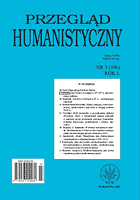W obronie niezależności narodu. Ruch narodowy w Polsce wobec wspólnot wyższego rzędu oraz idei integracyjnych w Europie w XX w.
In Defence of Nation ’s Independence National Movement in Poland towards Higher Status Communities and Integrating Ideas in the 20th Century Europe
Author(s): Grzegorz Radomski, Witold WojdyłoSubject(s): Cultural Essay, Political Essay, Societal Essay
Published by: Wydawnictwa Uniwersytetu Warszawskiego
Keywords: independence - Poland; national movement - Poland
Summary/Abstract: In the nationalistic thought the most crucial community is the national one. To protect national issues, foreign politics was taken into account, including international political associations. The idea of federation (also Polish-Lithuanian unions) was considered, though negatively viewed by National Democrats, while the Lublin Union was interpreted as a manifestation of Polish civilization thought in the East. W. Sikorski’s idea of Polish-Czech confederation received a more positive response in the times of World War II. National Democrats even participated in the New Slavonic Assembly in Prague. Their ambivalent attitude to the concept was due to Russia’s pursuit towards Pan-Slavonic ideas. In the period of the Second World War, Karol Stojanowski advocated the idea of the Slavonic Empire as an anti-thesis to the German oppression. Among Polish nationalists’ reflections, there was an idea of Latin civilization community based on Catholicism. However, international institutions, such as the League of Nations or the United Nations Organization, received a rather hostile response. Their only positive role was reduced to keeping international order assuring independence of Poland. In Polish nationalists’ views, there are traces of anti-Semitism and conspiratorial theory of history.
Journal: Przegląd Humanistyczny
- Issue Year: 406/2006
- Issue No: 03
- Page Range: 83-97
- Page Count: 15
- Language: Polish
- Content File-PDF

